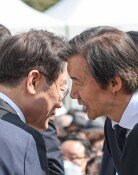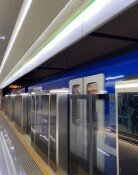Gov`t to create `Silicon Valley of Korea` in Pangyo and Sangam
Gov`t to create `Silicon Valley of Korea` in Pangyo and Sangam
Posted January. 19, 2016 07:31,
Updated January. 19, 2016 13:40
The government has made a scheme to nurture Pangyo and Sangam areas as Asias Silicon Valley by creating hubs for start-ups and cultural contents. The project will require 80 trillion won (60.6 billion U.S. dollars) of investment, which amounts to 1/3 of this years total policy funds budget. The plan includes creating 760,000 jobs in the bio health sector by attracting more foreign patients and promoting exports of Korean medicine and telemedicine.
Six government departments including the Ministry of Science, ICT, and Future Planning, the Ministry of Culture, Sports, and Tourism, the Financial Supervisory Commission, the Ministry of Trade, Industry and Energy, the Ministry of Welfare, and the Korea Communications Commission reported the scheme to President Park Geun-hye on Monday. The goal of the project is to create new growth engines through pursuing creative economy and cultural enrichment, especially by expanding core industries of our economy to cover the culture and bio health sectors and encouraging start-ups.
In Pangyo area, located in Seongnam, Gyeonggi province, the Startup Campus and other facilities will be established to support promising start-ups and help them enter overseas markets. Creative economy innovation centers will serve as a bridge where conglomerates and smaller businesses cooperate in breeding the so-called unicorn companies that produce more than 1 trillion won (82.54 million dollars) worth of revenue.
On the other hand, Sangam area in Mapo-gu, Seoul, will become a hub of digital cultural contents by converging culture and ICT. Creative cultural contents in games, webtoons, movies, animations, etc., are expected to be born one after another using state-of-the-art technologies, such as VR and AR.
The Ministry of Welfare plans to increase the number of incoming medical tourists from 280,000 now to 400,000 annually, expand the number of hospitals doing business abroad to 155, and start pilot projects for telemedicine in Peru and China. The plan includes raising 150 billion won (12.3 million dollars) as a global healthcare fund to foster bio medicine businesses that export technologies to the world.
The Financial Services Commission plans to invest a total of 80 trillion won (60.6 million dollars) , of which 72.4 trillion won will go to promoting creative economy and 7.2 trillion to cultural enrichment projects. The creative economy sector includes ICT convergence such as smart cars, bio health industries represented by robotic surgery technology, and the energy sector, particularly electric cars.







